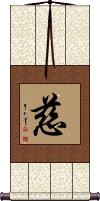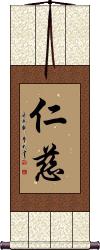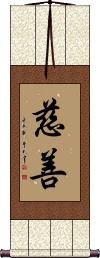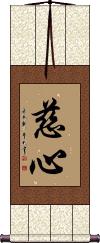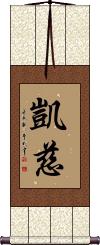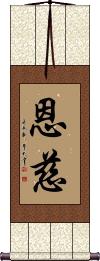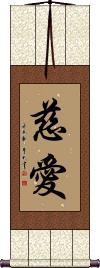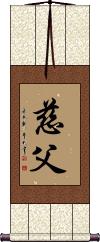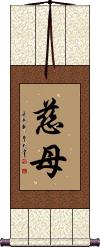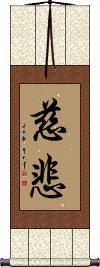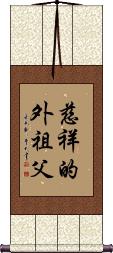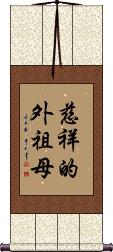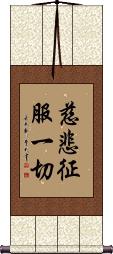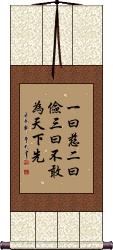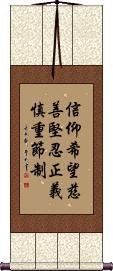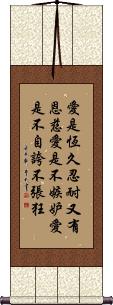Many custom options...
And formats...

慈 in Chinese / Japanese...
Buy an 慈 calligraphy wall scroll here!
Personalize your custom “慈” project by clicking the button next to your favorite “慈” title below...
3. Charity
4. Compassionate Heart / Benevolent Heart
5. Kaici
6. Kindness
10. Mercy / Compassion / Buddhist Loving Kindness
11. Benevolent Heart
12. Love Between Child and Parents
17. Loving-Kindness Conquers All
18. Daodejing / Tao Te Ching - Excerpt
20. Corinthians 13:4
Mercy / Compassion / Love
慈 is the simplest way to express the idea of compassion.
This can also mean love for your fellow humans, humanity, or living creatures. Sometimes this is extended to mean charity.
This term is often used in a Buddhist or Christian context. The concept was also spoken of by Laozi (Lao Tzu) in the Dao De Jing (Tao Te Ching).
慈 is considered the direct translation of the Sanskrit word मैत्री (maitrī) Pali word मेत्ता (mettā). In this context, it means benevolence, loving kindness, and goodwill.
This Chinese character is understood in Japanese but is usually used in compound words (not seen alone). Also used in old Korean Hanja, so it's very universal.
Kindness / Benevolence
仁慈 word is used in Chinese, Korean, Japanese, and Asian Buddhism to relay the important idea of loving kindness.
仁慈 can also be defined as: benevolent; charitable; kind; merciful; kind-hearted; benevolence; kindness; humanity; mercy.
In Japanese, this can also be the given name Hitoji. This would also be a good Mandarin Chinese given name romanized as Jentzu (in Taiwan) or Renci (which sounds like ren-tsuh).
Charity
There are a few different words used to express charity in Chinese characters, Japanese Kanji and old Korean Hanja but 慈善 is the most common.
Some of the other words describe acts such as “giving alms” etc.
Note: Sometimes this is translated as benevolence or benevolent.
Also, this considered to be one of the Seven Heavenly Virtues.
If you need a different meaning, just contact me.
Compassionate Heart / Benevolent Heart
Kaici
Kindness
Love and Devotion
慈愛 refers to the kind of love and devotion you might have to your children or any loved one.
This especially applied to your children but could also be any member of your family - spouse, etc.
This can also be translated as affection, kindness, love, to love affectionately.
慈愛 is also used in a Buddhist context with the same meaning.
In Japanese, this can also be a female given name romanized as Yasue.
Loving Father
慈父 is the title of a loving father, affectionate father, or merciful father.
A great gift for your dad.
Loving Mother
慈母 create the title of a loving mother, affectionate mother, or merciful mother.
A great gift for your mom.
Mercy / Compassion / Buddhist Loving Kindness
Besides the title above, 慈悲 can also be defined as clemency or lenience and sometimes the act of giving charity.
In the Buddhist context, it can be defined as “benevolence,” “loving-kindness and compassion,” or “mercy and compassion.”
This Buddhist virtue is perhaps the most important to employ in your life. All sentient beings that you encounter should be given your loving kindness. And trust me, however much you can give, it comes back. Make your life and the world a better place!
This Chinese/Japanese Buddhist term is the equivalent of Metta Karuna from Pali or Maitri Karuna from Sanskrit.
慈 can mean loving-kindness by itself.
悲 adds a component of sorrow, empathy, compassion, and sympathy for others.
Benevolent Heart
慈悲の心 means benevolent heart, compassionate heart, or merciful heart in Japanese.
This is a Japanese-only phrase and should be ordered from our Japanese master calligrapher. This is because the third character is unique Hiragana.
Chances are you are into Inuyasha and are seeking the title of chapter 471 which is often translated as “Merciful Heart.”
Love Between Child and Parents
Loving Grandfather
Maternal (Northern China)
Loving Grandfather
Maternal (Southern China - Informal)
Loving Grandfather
Paternal (Northern China)
Loving Grandfather
Paternal (Southern China)
Loving Grandmother
Maternal (Northern China)
Loving Grandmother
Maternal (Southern China)
Loving Grandmother
Paternal (Northern China)
Loving Grandmother
Paternal (Southern China)
Loving Grandfather
Maternal (Southern China)
Loving Grandmother
Maternal (Southern China - formal)
Loving-Kindness Conquers All
慈悲征服一切 is a way to express the idea that mercy, compassion, and loving-kindness can overcome all things.
This phrase is composed of 3 Chinese words:
慈悲 = loving-kindness; mercy; compassion; benevolence. It's used in Buddhism a lot to express the idea of how one should treat everyone else and all living beings.
征服 = to conquer; to subdue; to vanquish; to overcome.
一切 = all; everything; the whole; lock, stock, and barrel; without exception.
Daodejing / Tao Te Ching - Excerpt
Excerpt from Chapter 67
一曰慈二曰儉三曰不敢為天下先 is an excerpt from the 67th Chapter of Lao Tzu's (Lao Zi's) Te-Tao Ching (Dao De Jing).
This is the part where the three treasures are discussed. In English, we'd say these three treasures are compassion, frugality, and humility. Some may translate these as love, moderation, and lack of arrogance. I have also seen them translated as benevolence, modesty, and “Not presuming to be at the forefront in the world.” You can mix them up the way you want, as translation is not really a science but rather an art.
I should also explain that the first two treasures are single-character ideas, yet the third treasure was written out in six characters (there are also some auxiliary characters to number the treasures).
If Lao Tzu's words are important to you, then a wall scroll with this passage might make a great addition to your home.
Seven Heavenly Virtues
信仰希望慈善堅忍正義慎重節制 is a list in Chinese and Japanese Kanji of an interpretation of the Seven Heavenly Virtues.
1. Faith is belief in God, and the right virtues.
2. Hope is taking a positive future view that good will prevail.
3. Charity is a concern for, and active helping of, others.
4. Fortitude is never giving up.
5. Justice is being fair and equitable with others.
6. Prudence is care of and moderation with money.
7. Temperance is moderation of needed things and abstinence from things that are not needed.
The full list is here. 信仰希望慈善堅忍正義慎重節制 is a word list, not a common phrase. While all Chinese and Japanese people will recognize the words in the list, they may not understand what the list is about (unless they are familiar with the Seven Heavenly Virtues).
don’t get this as a tattoo or anything like that without first consulting a native translator in the target language. These are fine for a wall scroll but a long discussion is needed before you commit to this for a lifetime inking commitment.
Corinthians 13:4
All you need to know about LOVE
愛是恆久忍耐又有恩慈愛是不嫉妒愛是不自誇不張狂 is 1st Corinthians 13:4 in Chinese.

With large “love” character added.
In English, this reads:
1st Corinthians 13:4 (KJV) Charity suffereth long, and is kind; charity envieth not; charity vaunteth not itself, is not puffed up...
1st Corinthians 13:4 (NIV) Love is patient, love is kind. It does not envy, it does not boast, it is not proud.
1st Corinthians 13:4 (Basic English) Love is never tired of waiting; love is kind; love has no envy; love has no high opinion of itself, love has no pride.
The Chinese translation follows the love meaning, rather than the King James' use of “charity.” I was a little confused when writing this description with the significant differences between the NIV vs. KJV translations. After speaking to a Greek scholar about this, it would seem that the KJV has an almost errant translation with the use of “charity” in place of “love.”
We used the most popular Christian Chinese Bible, which is the Chinese Union Version (CUV). The CUV was first published in 1919. We use this so that the Chinese translation would be as accurate and standard as possible. Any Chinese Christian worth their salt will easily be able to identify this verse when they see these characters.
If you want a big “love” character written above the verse on your artwork, just make a note in the “special instructions” tab when you are customizing your artwork. There is no extra charge for that service on this special verse.
Galatians 5:22-23
Here is Galatians 5:22 and a bit of 23 in Chinese.
The text with punctuation:
圣灵所结的果子,就是仁爱,喜乐,和平,忍耐,恩慈,良善,信实,温柔,节制。
Hand-painted calligraphy does not retain punctuation.
This translation is from the Chinese Union Bible.
You may know it from the KJV as:
5:22 But the fruit of the Spirit is love, joy, peace, longsuffering, gentleness, goodness, faith,
5:23 Meekness, temperance...
Not the results for 慈 that you were looking for?
Below are some entries from our dictionary that may match your 慈 search...
| Characters If shown, 2nd row is Simp. Chinese |
Pronunciation Romanization |
Simple Dictionary Definition |
慈 see styles |
cí ci2 tz`u tzu yoshimi よしみ |
More info & calligraphy: Mercy / Compassion / Love(personal name) Yoshimi Affection (as that of a mother), mercy, compassion, tenderness; mother. |
仁慈 see styles |
rén cí ren2 ci2 jen tz`u jen tzu hitoji ひとじ |
More info & calligraphy: Kindness / Benevolencekind-hearted; benevolence; (given name) Hitoji benevolence |
恩慈 see styles |
ēn cí en1 ci2 en tz`u en tzu onji おんじ |
More info & calligraphy: Kindness(surname) Onji favour |
慈善 see styles |
cí shàn ci2 shan4 tz`u shan tzu shan jizen じぜん |
More info & calligraphy: Charitycharity; benevolence; philanthropy |
慈心 see styles |
cí xīn ci2 xin1 tz`u hsin tzu hsin jishin じしん |
More info & calligraphy: Compassionate Heart / Benevolent HeartA compassionate heart. |
慈悲 see styles |
cí bēi ci2 bei1 tz`u pei tzu pei jihi じひ |
More info & calligraphy: Mercy / Compassion / Buddhist Loving Kindness(noun - becomes adjective with の) (1) mercy; compassion; clemency; pity; charity; benevolence; (2) (abbreviation) (See 慈悲心鳥) rufous hawk-cuckoo; northern hawk-cuckoo Compassion and pity, merciful, compassionate. |
慈愛 慈爱 see styles |
cí ài ci2 ai4 tz`u ai tzu ai yasue やすえ |
More info & calligraphy: Love and Devotionaffection (esp. parental); love; fondness; (female given name) Yasue to love affectionately |
慈母 see styles |
cí mǔ ci2 mu3 tz`u mu tzu mu jibo じぼ |
More info & calligraphy: Loving Mother(See 慈父) affectionate mother |
慈父 see styles |
jifu じふ |
More info & calligraphy: Loving Father |
父慈子孝 see styles |
fù cí zǐ xiào fu4 ci2 zi3 xiao4 fu tz`u tzu hsiao fu tzu tzu hsiao |
More info & calligraphy: Love Between Child and Parents |
三慈 see styles |
sān cí san1 ci2 san tz`u san tzu sanji |
three kinds of compassion |
丘慈 see styles |
qiū cí qiu1 ci2 ch`iu tz`u chiu tzu Kyuji |
屈支; 龜兹 q. v. Kuche, Karashahr. |
乃慈 see styles |
nochi のち |
(female given name) Nochi |
久慈 see styles |
hisaji ひさじ |
(surname, given name) Hisaji |
乙慈 see styles |
otoshige おとしげ |
(given name) Otoshige |
令慈 see styles |
lìng cí ling4 ci2 ling tz`u ling tzu |
Your esteemed mother (honorific) |
伸慈 see styles |
nobushige のぶしげ |
(personal name) Nobushige |
佳慈 see styles |
keiji / keji けいじ |
(male given name) Keiji |
修慈 see styles |
xiū cí xiu1 ci2 hsiu tz`u hsiu tzu shuuji / shuji しゅうじ |
(given name) Shuuji cultivating compassion |
健慈 see styles |
kenji けんじ |
(given name) Kenji |
優慈 see styles |
yuuji / yuji ゆうじ |
(personal name) Yūji |
元慈 see styles |
genji げんじ |
(given name) Genji |
先慈 see styles |
xiān cí xian1 ci2 hsien tz`u hsien tzu |
(literary) my late mother |
具慈 see styles |
guji; guji ぐじ; グジ |
(kana only) (kyb:) (See 甘鯛) tilefish (Branchiostegus spp.); blanquillo; horse-head fish |
兼慈 see styles |
kaneji かねじ |
(given name) Kaneji |
剛慈 see styles |
gouji / goji ごうじ |
(personal name) Gouji |
博慈 see styles |
hiroshige ひろしげ |
(personal name) Hiroshige |
友慈 see styles |
yuuji / yuji ゆうじ |
(male given name) Yūji |
命慈 see styles |
meji めじ |
(female given name) Meji |
啓慈 see styles |
keiji / keji けいじ |
(given name) Keiji |
Click here for more 慈 results from our dictionary
The following table may be helpful for those studying Chinese or Japanese...
| Title | Characters | Romaji (Romanized Japanese) | Various forms of Romanized Chinese | |
| Mercy Compassion Love | 慈 | ji | cí / ci2 / ci | tz`u / tzu |
| Kindness Benevolence | 仁慈 | jin ji / jinji | rén cí / ren2 ci2 / ren ci / renci | jen tz`u / jentzu / jen tzu |
| Charity | 慈善 | ji zen / jizen | cí shàn / ci2 shan4 / ci shan / cishan | tz`u shan / tzushan / tzu shan |
| Compassionate Heart Benevolent Heart | 慈心 | jishin | cí xīn / ci2 xin1 / ci xin / cixin | tz`u hsin / tzuhsin / tzu hsin |
| Kaici | 凱慈 凯慈 | kǎi cí / kai3 ci2 / kai ci / kaici | k`ai tz`u / kaitzu / kai tzu | |
| Kindness | 恩慈 | onji | ēn cí / en1 ci2 / en ci / enci | en tz`u / entzu / en tzu |
| Love and Devotion | 慈愛 慈爱 | jiai | cí ài / ci2 ai4 / ci ai / ciai | tz`u ai / tzuai / tzu ai |
| Loving Father | 慈父 | jifu | cí fù / ci2 fu4 / ci fu / cifu | tz`u fu / tzufu / tzu fu |
| Loving Mother | 慈母 | ji bo / jibo | cí mǔ / ci2 mu3 / ci mu / cimu | tz`u mu / tzumu / tzu mu |
| Mercy Compassion Buddhist Loving Kindness | 慈悲 | ji hi / jihi | cí bēi / ci2 bei1 / ci bei / cibei | tz`u pei / tzupei / tzu pei |
| Benevolent Heart | 慈悲の心 | ji hi no kokoro jihinokokoro | ||
| Love Between Child and Parents | 父慈子孝 | fù cí zǐ xiào fu4 ci2 zi3 xiao4 fu ci zi xiao fucizixiao | fu tz`u tzu hsiao futzutzuhsiao fu tzu tzu hsiao |
|
| Loving Grandfather | 慈祥的老爺 慈祥的老爷 | cí xiáng de lǎo ye ci2 xiang2 de lao3 ye ci xiang de lao ye cixiangdelaoye | tz`u hsiang te lao yeh tzuhsiangtelaoyeh tzu hsiang te lao yeh |
|
| Loving Grandfather | 慈祥的外公 | cí xiáng de wài gōng ci2 xiang2 de wai4 gong1 ci xiang de wai gong cixiangdewaigong | tz`u hsiang te wai kung tzuhsiangtewaikung tzu hsiang te wai kung |
|
| Loving Grandfather | 慈祥的爺爺 慈祥的爷爷 | cí xiáng de yé ye ci2 xiang2 de ye2 ye ci xiang de ye ye cixiangdeyeye | tz`u hsiang te yeh yeh tzuhsiangteyehyeh tzu hsiang te yeh yeh |
|
| Loving Grandfather | 慈祥的祖父 | cí xiáng de zǔ fù ci2 xiang2 de zu3 fu4 ci xiang de zu fu cixiangdezufu | tz`u hsiang te tsu fu tzuhsiangtetsufu tzu hsiang te tsu fu |
|
| Loving Grandmother | 慈祥的姥姥 | cí xiáng de lǎo lao ci2 xiang2 de lao3 lao ci xiang de lao lao cixiangdelaolao | tz`u hsiang te lao lao tzuhsiangtelaolao tzu hsiang te lao lao |
|
| Loving Grandmother | 慈祥的外婆 | cí xiáng de wài pó ci2 xiang2 de wai4 po2 ci xiang de wai po cixiangdewaipo | tz`u hsiang te wai p`o tzuhsiangtewaipo tzu hsiang te wai po |
|
| Loving Grandmother | 慈祥的奶奶 | cí xiáng de nǎi nai ci2 xiang2 de nai3 nai ci xiang de nai nai cixiangdenainai | tz`u hsiang te nai nai tzuhsiangtenainai tzu hsiang te nai nai |
|
| Loving Grandmother | 慈祥的祖母 | cí xiáng de zǔ mǔ ci2 xiang2 de zu3 mu3 ci xiang de zu mu cixiangdezumu | tz`u hsiang te tsu mu tzuhsiangtetsumu tzu hsiang te tsu mu |
|
| Loving Grandfather | 慈祥的外祖父 | cí xiáng de wài zǔ fù ci2 xiang2 de wai4 zu3 fu4 ci xiang de wai zu fu cixiangdewaizufu | tz`u hsiang te wai tsu fu tzuhsiangtewaitsufu tzu hsiang te wai tsu fu |
|
| Loving Grandmother | 慈祥的外祖母 | cí xiáng de wài zǔ mǔ ci2 xiang2 de wai4 zu3 mu3 ci xiang de wai zu mu cixiangdewaizumu | tz`u hsiang te wai tsu mu tzuhsiangtewaitsumu tzu hsiang te wai tsu mu |
|
| Loving-Kindness Conquers All | 慈悲征服一切 | cí bēi zhēng fú yī qiè ci2 bei1 zheng1 fu2 yi1 qie4 ci bei zheng fu yi qie cibeizhengfuyiqie | tz`u pei cheng fu i ch`ieh tzupeichengfuichieh tzu pei cheng fu i chieh |
|
| Daodejing Tao Te Ching - Excerpt | 一曰慈二曰儉三曰不敢為天下先 一曰慈二曰俭三曰不敢为天下先 | yī yuē cí èr yuē jiǎn sān yuē bù gǎn wéi tiān xià xiān yi1 yue1 ci2 er4 yue1 jian3 san1 yue1 bu4 gan3 wei2 tian1 xia4 xian1 yi yue ci er yue jian san yue bu gan wei tian xia xian | i yüeh tz`u erh yüeh chien san yüeh pu kan wei t`ien hsia hsien i yüeh tzu erh yüeh chien san yüeh pu kan wei tien hsia hsien |
|
| Seven Heavenly Virtues | 信仰希望慈善堅忍正義慎重節制 信仰希望慈善坚忍正义慎重节制 | shinkou kibou jizen kennin seigi shinchou sessei shinko kibo jizen kennin seigi shincho sesei | xìn yǎng xī wàng cí shàn jiān rěn zhèng yì shèn zhòng jié zhì xin4 yang3 xi1 wang4 ci2 shan4 jian1 ren3 zheng4 yi4 shen4 zhong4 jie2 zhi4 xin yang xi wang ci shan jian ren zheng yi shen zhong jie zhi | hsin yang hsi wang tz`u shan chien jen cheng i shen chung chieh chih hsin yang hsi wang tzu shan chien jen cheng i shen chung chieh chih |
| Corinthians 13:4 | 愛是恆久忍耐又有恩慈愛是不嫉妒愛是不自誇不張狂 爱是恒久忍耐又有恩慈爱是不嫉妒爱是不自夸不张狂 | ài shì héng jiǔ rěn nài yòu yǒu én cí ài shì bú jì dù ài shì bú zì kuā bù zhāng kuáng ai4 shi4 heng2 jiu3 ren3 nai4 you4 you3 en2 ci2 ai4 shi4 bu2 ji4 du4 ai4 shi4 bu2 zi4 kua1 bu4 zhang1 kuang2 ai shi heng jiu ren nai you you en ci ai shi bu ji du ai shi bu zi kua bu zhang kuang | ai shih heng chiu jen nai yu yu en tz`u ai shih pu chi tu ai shih pu tzu k`ua pu chang k`uang ai shih heng chiu jen nai yu yu en tzu ai shih pu chi tu ai shih pu tzu kua pu chang kuang |
|
| Galatians 5:22-23 | 聖靈所結的果子就是仁愛喜樂和平忍耐恩慈良善信實溫柔節制 圣灵所结的果子就是仁爱喜乐和平忍耐恩慈良善信实温柔节制 | shèng líng suǒ jié de guǒ zi jiù shì rén ài xǐ lè he píng rěn nài ēn cí liáng shàn xìn shí wēn róu jié zhì sheng4 ling2 suo3 jie2 de guo3 zi jiu4 shi4 ren2 ai4 xi3 le4 he ping2 ren3 nai4 en1 ci2 liang2 shan4 xin4 shi2 wen1 rou2 jie2 zhi4 sheng ling suo jie de guo zi jiu shi ren ai xi le he ping ren nai en ci liang shan xin shi wen rou jie zhi | sheng ling so chieh te kuo tzu chiu shih jen ai hsi le ho p`ing jen nai en tz`u liang shan hsin shih wen jou chieh chih sheng ling so chieh te kuo tzu chiu shih jen ai hsi le ho ping jen nai en tzu liang shan hsin shih wen jou chieh chih |
|
| In some entries above you will see that characters have different versions above and below a line. In these cases, the characters above the line are Traditional Chinese, while the ones below are Simplified Chinese. | ||||
Successful Chinese Character and Japanese Kanji calligraphy searches within the last few hours...
